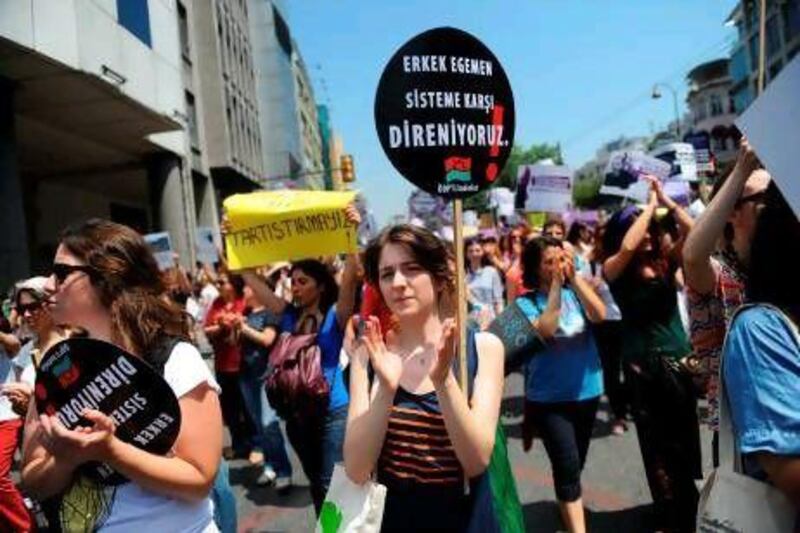ISTANBUL // A Turkish government plan to restrict abortion has angered women's groups against what they see as a move by Recep Tayyip Erdogan, the country's religiously conservative prime minister, to force his ideas of Islamic values on society.
In the biggest protest rally against the government plans so far, thousands of women marched in Istanbul on Sunday, carrying banners with slogans such as "State, keep your hands off my body" and "AKP - conservative killer and enemy of women", in a reference to Mr Erdogan's ruling Justice and Development Party (AKP).
The country's current abortion rule, in place since 1983, allows abortions on demand until the 10th week of pregnancy. News reports said the government wants to limit abortions to the first four weeks of pregnancy except for medical emergencies. The AKP insists no decision on limits had yet been taken.
Women's-rights organisations are planning further protests and will use contacts with government ministers to try to stop the reform plans, said Emel Armutcu, a leading member of the Rightful Women Platform - an umbrella group campaigning for women's rights.
But she conceded women were facing a struggle. "I am very concerned, it's a difficult situation."
Last week, police clashed with female demonstrators in the city of Eskisehir. News reports said eight were arrested.
The abortion debate, started by Mr Erdogan last month, has led to growing fears in parts of Turkey's society that the prime minister is trying to replace the country's secular system with one based on Islamic values.
Ms Armutcu said she had never believed in accusations by government critics who claim that Mr Erdogan is following a secret agenda for an Islamisation of Turkey. "But now I am afraid," she said.
In a speech on May 26, Mr Erdogan surprised friend and foe by publicly comparing abortion to the violent death of civilians in a botched air raid on the border with Iraq.
"I regard abortion as a crime," the prime minister told a meeting of an AKP women's organisation in Ankara, according to the text of the speech posted on the AKP website. "I say every abortion is an Uludere," he said in reference to a town on the Turkish-Iraqi border where 34 smugglers were killed in a Turkish air raid in December that was launched because the smugglers were mistaken as Kurdish rebels.
Mr Erdogan said: "I am asking you: what is the difference between killing a little one in the womb of his mother and killing it after birth?"
He also spoke out against the high rate of Caesarean births in Turkey, adding there was an "insidious plan" to keep Turkey from becoming a major international power by reducing population growth. He did not say who was behind the alleged plan. For years, Mr Erdogan has been calling on Turkish families to have at least three children to keep Turkey's population growing.
There were roughly 70,000 abortions last year, according to government figures. United Nations statistics show Turkey's abortion rate of 14.8 for every 1,000 women is far below the global average of 28 abortions per 1,000 women.
Mr Erdogan is known for using tough language and populist messages designed to please religiously conservative voters, but steps he took after his initial statement showed he is serious about the abortion issue. Four days after his announcement, Mr Erdogan said he had asked his government to draw up a new abortion law.
Recep Akdag, the health minister, said the government wanted parliament, where the AKP has a majority, to pass the law this month.
Ayhan Sefer Ustun, a senior AKP politician, added to the controversy by demanding that abortions also should be banned in cases of rape.
Mehmet Gormez, the president of Turkey's religious watchdog, the Directorate for Religious Affairs, yesterday supported the government. "An embryo in the mother's womb has a right to live," Mr Gomez said. "No one has a right to end his life."
His remarks came after some experts said Islam tolerated abortions until the fourth month of pregnancy. Pinar Ilkkaracan, a researcher specialising in women's rights in Muslim countries, told the Aksam newspaper the Hanafi school of thought in Islam accepted abortions up until 120 days of pregnancy, while the Maliki school put the limit at 40 days. "It is very clear that Islam allows abortion," she said.
Ms Armutcu said she was still trying to understand why Mr Erdogan had opened the debate, as the current abortion rule had not been controversial. "We don't know where that came from."
In an open letter to Mr Erdogan, Ms Armutcu's group, the Rightful Women Platform, said the prime minister's stance on abortion and population growth failed to take other aspects of social policy into account.
"If you wish to increase our population and become a strong nation, first of all we suggest that you let all male and female students in every part of Turkey get quality education equally," the letter said. "We suggest you provide economic opportunities to all parents so that they can work and get sufficient income to provide for their children's education and future as they wish to."
Even members of Mr Erdogan's government were surprised by the abortion initiative.
Ms Armutcu said she was attending a previously scheduled meeting of women's-rights activists with Fatma Sahin, the minister for women's affairs, when news broke that the prime minister had instructed his cabinet to come up with a new abortion law.
"It was news to her," Ms Armutcu said about Ms Sahin.






